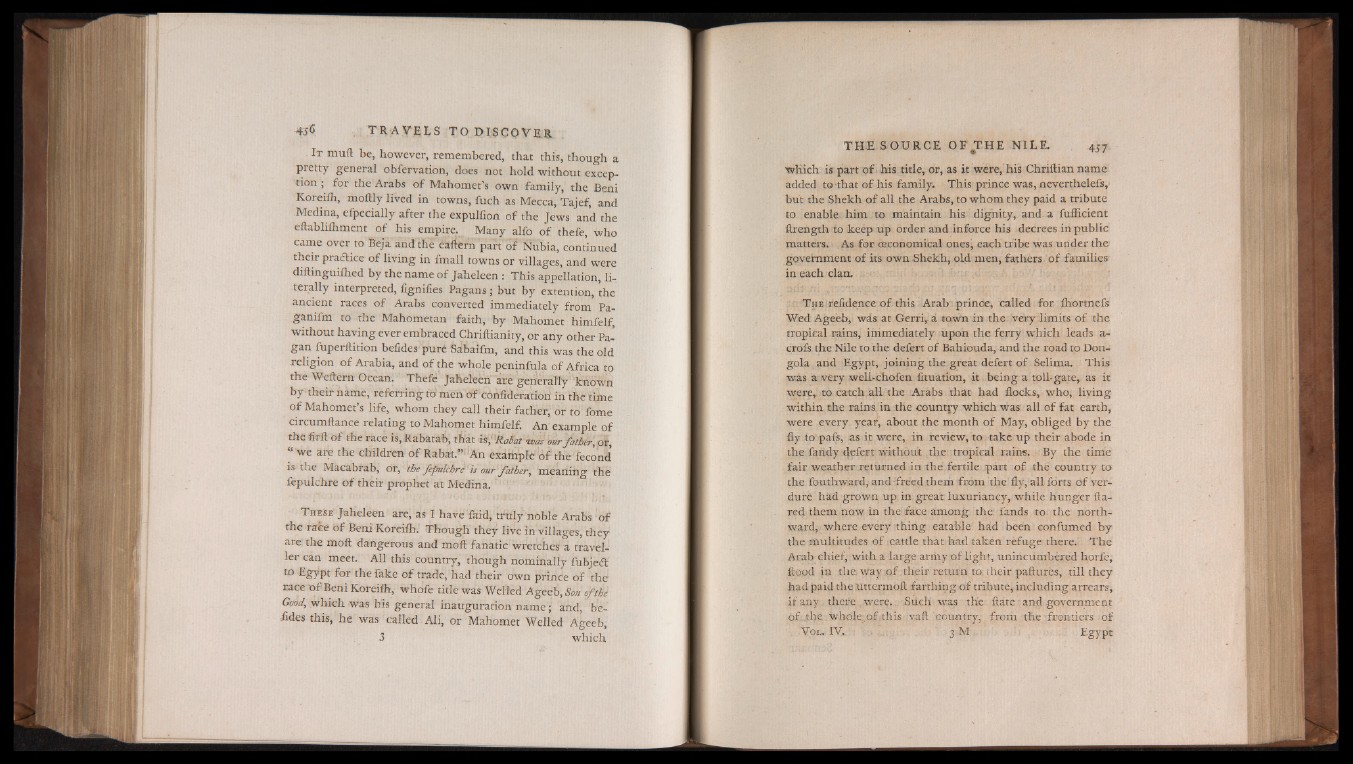
I t mull be, however, remembered, that this, though a
pretty general obfervation, does not hold without exception
; for the Arabs o f Mahomet’s own family, the Beni
Koreiih, moftly lived in towns, fuch as Mecca, Tajef, and
Medina, efpecially after the expulfion o f the Jews and the
eftabhihment o f his empire. Many alfo o f thefe, who
came over to Beja and the ékffem part o f Nubia, continued
their practice o f living in fmall towns or villages, and were
diftinguiflied by the name o f Jaheleen : This appellation, literally
interpreted, fignifies Pagans ; but by extention, the
ancient races o f Arabs converted immediately from Pa-
ganifm to the Mahometan faith, by Mahomet himfelf,
without having ever embraced Chriftianity, or any other Pagan
fuperftition befides purè Sabaifm, and this was the old
religion o f Arabia, and o f the whole peninfula o f Africa to
the Weftern Ocean. Thefe Jaheleen arc generally known
by-their name, referring-to men o f cónfideratiori in the time
o f Mahomet’s life, whom they call their father, or to fome
circumftance relating to Mahomet himfelf. An example o f
the firft o f the race is, Rabatab, that \$i Raòal ivus our jathcr, or,
“ 'we are the children o f Rabat.1” An exariiple o f the fecond’
is the Macabrab, or, the fepttlchr? 'is our father, mearimg the
fepulchre o f their prophet at Medina.
T h e s e Jaheleen are, as I have faid, truly noble Arabs o f
the race Of Beni Koreiih. Though they live in villages, they
are the moll dangerous and molt fanatic wretches a traveller
can meet.. All this country, though nominally fubjeél
10 E£ypt for the fake o f trade, had their own prinCe o f the
race o f Beni Koreiih, whofe title was Welled Ageeb, Son o f the
Good, which was his general inauguration name ; and, be-
fldes this, he was called Ali, or Mahomet Welled Ageeb,
3 which
which is part o f - his title, or, as it were, his Chriftian name
added to-that o f his family. This prince was, neverthelefs,
but the Shekh o f a ll the Arabs, to whom they paid a tribute
to enable him to maintain his dignity, and a fuflicient
ftrength to keep up order and inforce his decrees in public
matters. As for oeconomical ones, each tribe was under the
government o f its own Shekh, old men, fathers o f families
in each clan.
T h e rcftdcnce o f this Arab prince, called for ihortnefs
Wed Ageeb, was at Gerri, a town in the very limits o f the
tropical rains, immediately upon the ferry which leads a-
crofs the Nile to the defert o f Bahiouda, and the road to Don-
gola and Egypt, joining the great defert o f Selima. This
was a very well-chofen fituation, it being a toll-gate, as it
were, to catch all the Arabs that had flocks, who, livin g
within the rains in the country which was all o f fat earth,
were every year, about the month o f May, obliged by the
fly to pafs, as it were, in review, to take up their abode in
the fandy defert without the tropical rain«. By the time
fair weather returned in the fertile part o f the country to
the fouth ward, and-freed them from the fly, all forts o f verdure
had grown up in great luxuriancy, while hunger flared
them now in the face among the fands to. the northward,
where every thing eatable had been confumed by
the multitudes o f cattle that had taken refuge there. The
Arab chiefj with a large army o f light, unincumbered horfe,
flood in the way o f their return to: their paftures, till they
had paid the .Uttermoft farthing o f tribute, including arrears,
i f any there were. Such was the ftate and government
o f the whole, o f .this vaft country, from the frontiers o f
V o l . IV. 3 M Egypt